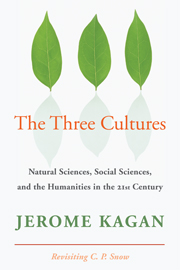1 - Characterizing the Three Cultures
Published online by Cambridge University Press: 07 August 2009
Summary
The influential British novelist and science administrator C. P. Snow, who had trained as a natural scientist, published a lecture delivered in Cambridge University in 1959 titled “The Two Cultures.” The lecture and the fifty-one-page book that followed provoked heated discussion because of its brash dismissal of the humanities as an intellectual mission lacking in rigor and unable to contribute to the welfare of those living in economically underdeveloped regions. Not surprisingly, humanists resented Snow's allegations that world peace and prosperity would profit from training more scientists and engineers and fewer historians, philosophers, and literary critics. Three years later, F. R. Leavis, an admired literary critic at Cambridge University, delivered an unusually harsh, occasionally impolite, rebuttal that caricatured Snow as a failed chemist, incompetent novelist, and social commentator who was ignorant of the world's serious problems.
Snow composed his essay as America was about to experience an extraordinary expansion in higher education that led to a fourfold increase in faculty (from 250,000 to more than 1 million) and a sevenfold increase in students to a total of 15 million, compared with only 50,00 Americans who were attending colleges in 1870. These changes were due primarily to the establishment of new community colleges and rising enrollments in state universities trying to accommodate the many World War II veterans who, assisted by the government's decision to subsidize their education in gratitude for their service, chose to attend college rather than return to the working-class jobs held by their fathers.
- Type
- Chapter
- Information
- The Three CulturesNatural Sciences, Social Sciences, and the Humanities in the 21st Century, pp. 1 - 50Publisher: Cambridge University PressPrint publication year: 2009



